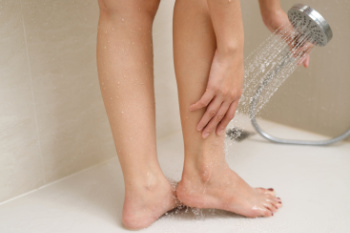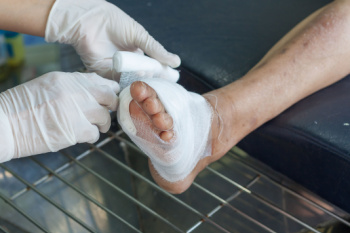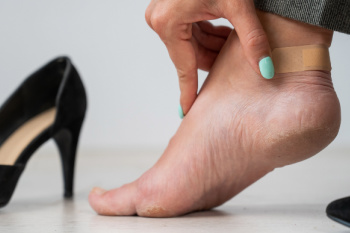Connect With Us
Blog
Items filtered by date: May 2024
Simple Daily Care Tips to Nurture Your Feet

Everyday foot care is essential for keeping your feet healthy, comfortable, and free from common issues like dryness, odor, and rough skin. Begin by washing your feet daily with warm water and a gentle soap to remove dirt and bacteria. After washing, take a few minutes to exfoliate your feet using a pumice stone or foot scrub to slough off dead skin cells and promote smoothness. Follow up by moisturizing your feet with nourishing foot cream or lotion, paying special attention to areas prone to dryness like heels and soles. For an extra treat, indulge in a foot soak once or twice a week, adding Epsom salts or essential oils to warm water to soothe tired feet and soften rough skin. Finally, dusting your feet with a foot powder can help absorb moisture, reduce friction, and keep your feet feeling fresh throughout the day. If you have a foot condition and need help, it is suggested that you confer with a podiatrist.
Everyday foot care is very important to prevent infection and other foot ailments. If you need your feet checked, contact Dr. Nicholas Przystawski from Central Florida Foot Care, PA. Our doctor can provide the care you need to keep you pain-free and on your feet.
Everyday Foot Care
Often, people take care of their bodies, face and hair more so than they do for their feet. But the feet are a very important aspect of our bodies, and one that we should pay more attention to. Without our feet, we would not be able to perform most daily tasks.
It is best to check your feet regularly to make sure there are no new bruises or cuts that you may not have noticed before. For dry feet, moisturizer can easily be a remedy and can be applied as often as necessary to the affected areas. Wearing shoes that fit well can also help you maintain good foot health, as well as making it easier to walk and do daily activities without the stress or pain of ill-fitting shoes, high heels, or even flip flops. Wearing clean socks with closed shoes is important to ensure that sweat and bacteria do not accumulate within the shoe. Clean socks help to prevent Athlete’s foot, fungi problems, bad odors, and can absorb sweat.
If you have any questions please feel free to contact our office located in Leesburg, FL . We offer the newest diagnostic and treatment technologies for all your foot and ankle needs.
Reasons Why Your Big Toe Is Numb

Numbness in the big toe can be a perplexing sensation, ranging from a slight tingling to a complete loss of feeling. While big toe numbness might seem like a minor inconvenience at first, it could be a sign of underlying issues that need attention. One of the most common causes is wearing shoes that are too tight. Footwear that constricts the toes can impede circulation and lead to numbness. Conditions that involve stiffness in the joint at the base of the big toe are often accompanied by bone spurs that may press on nerves, causing numbness. Nerve damage, often associated with conditions like diabetes or autoimmune diseases, also can result in numbness, tingling, or pain in the toes. A bunion, which is a bony bump at the base of the big toe can exert pressure on surrounding nerves and lead to numbness. Exposure to freezing temperatures can damage tissues, causing numbness in the toes. Finally, Raynaud’s disease, a vascular condition that results in spasms in small arteries of the feet, can lead to numbness and discoloration in the toes, particularly in response to cold or stress. If you are experiencing persistent numbness in your big toe, it is suggested that you schedule an appointment with a podiatrist for a thorough exam and treatment options based on the results.
Neuropathy
Neuropathy can be a potentially serious condition, especially if it is left undiagnosed. If you have any concerns that you may be experiencing nerve loss in your feet, consult with Dr. Nicholas Przystawski from Central Florida Foot Care, PA. Our doctor will assess your condition and provide you with quality foot and ankle treatment for neuropathy.
What Is Neuropathy?
Neuropathy is a condition that leads to damage to the nerves in the body. Peripheral neuropathy, or neuropathy that affects your peripheral nervous system, usually occurs in the feet. Neuropathy can be triggered by a number of different causes. Such causes include diabetes, infections, cancers, disorders, and toxic substances.
Symptoms of Neuropathy Include:
- Numbness
- Sensation loss
- Prickling and tingling sensations
- Throbbing, freezing, burning pains
- Muscle weakness
Those with diabetes are at serious risk due to being unable to feel an ulcer on their feet. Diabetics usually also suffer from poor blood circulation. This can lead to the wound not healing, infections occurring, and the limb may have to be amputated.
Treatment
To treat neuropathy in the foot, podiatrists will first diagnose the cause of the neuropathy. Figuring out the underlying cause of the neuropathy will allow the podiatrist to prescribe the best treatment, whether it be caused by diabetes, toxic substance exposure, infection, etc. If the nerve has not died, then it’s possible that sensation may be able to return to the foot.
Pain medication may be issued for pain. Electrical nerve stimulation can be used to stimulate nerves. If the neuropathy is caused from pressure on the nerves, then surgery may be necessary.
If you have any questions, please feel free to contact our office located in Leesburg, FL . We offer the newest diagnostic and treatment technologies for all your foot care needs.
Diabetes and Foot Complications

Foot complications are prevalent in individuals with diabetes and can lead to severe consequences if left untreated. Neuropathy, or nerve damage, can result in loss of sensation, making it difficult to detect injuries or wounds. Skin changes, calluses, and foot ulcers are common due to reduced circulation and impaired healing. In severe cases, untreated ulcers can lead to infections, sometimes necessitating amputation. Preventive measures include daily foot inspections, wearing proper footwear, and regular podiatric care. If you have diabetes, it is strongly suggested that you include a podiatrist on your healthcare team. This medical professional can assess your foot health, provide education on foot care, and help manage possible complications.
Diabetic foot care is important in preventing foot ailments such as ulcers. If you are suffering from diabetes or have any other concerns about your feet, contact Dr. Nicholas Przystawski from Central Florida Foot Care, PA. Our doctor can provide the care you need to keep you pain-free and on your feet.
Diabetic Foot Care
Diabetes affects millions of people every year. The condition can damage blood vessels in many parts of the body, especially the feet. Because of this, taking care of your feet is essential if you have diabetes, and having a podiatrist help monitor your foot health is highly recommended.
The Importance of Caring for Your Feet
- Routinely inspect your feet for bruises or sores.
- Wear socks that fit your feet comfortably.
- Wear comfortable shoes that provide adequate support.
Patients with diabetes should have their doctor monitor their blood levels, as blood sugar levels play such a huge role in diabetic care. Monitoring these levels on a regular basis is highly advised.
It is always best to inform your healthcare professional of any concerns you may have regarding your feet, especially for diabetic patients. Early treatment and routine foot examinations are keys to maintaining proper health, especially because severe complications can arise if proper treatment is not applied.
If you have any questions please feel free to contact our office located in Leesburg, FL . We offer the newest diagnostic and treatment technologies for all your foot and ankle needs.
Plantar Warts Can Be Treated!
Blistery Foot Woes

Blisters on the feet are often caused by friction from wearing ill-fitting shoes or engaging in prolonged physical activity. Corns can also result from burns, allergic reactions, or fungal infections. These fluid-filled pockets form as a protective response to pressure or irritation on the skin. While blisters are usually harmless, they can become painful if they rupture or get infected. Preventing blisters involves wearing properly fitting shoes, using moisture-wicking socks, and avoiding repetitive friction on the skin. Applying cushioning pads or bandages to high-friction areas can also help reduce the risk of blister formation. Podiatrists can provide treatment to relieve pain, prevent infection, and address underlying factors that contribute to blister formation, ensuring optimal foot health and comfort. If you have a foot blister that persists or has become painful or infected, it is suggested that you seek professional care from a podiatrist.
Blisters may appear as a single bubble or in a cluster. They can cause a lot of pain and may be filled with pus, blood, or watery serum. If your feet are hurting, contact Dr. Nicholas Przystawski of Central Florida Foot Care, PA. Our doctor can provide the care you need to keep you pain-free and on your feet.
Foot Blisters
Foot blisters are often the result of friction. This happens due to the constant rubbing from shoes, which can lead to pain.
What Are Foot Blisters?
A foot blister is a small fluid-filled pocket that forms on the upper-most layer of the skin. Blisters are filled with clear fluid and can lead to blood drainage or pus if the area becomes infected.
Symptoms
(Blister symptoms may vary depending on what is causing them)
- Bubble of skin filled with fluid
- Redness
- Moderate to severe pain
- Itching
Prevention & Treatment
In order to prevent blisters, you should be sure to wear comfortable shoes with socks that cushion your feet and absorb sweat. Breaking a blister open may increase your chances of developing an infection. However, if your blister breaks, you should wash the area with soap and water immediately and then apply a bandage to the affected area. If your blisters cause severe pain it is important that you call your podiatrist right away.
If you have any questions, please feel free to contact our office located in Leesburg, FL . We offer the newest diagnostic and treatment technologies for all your foot care needs.

